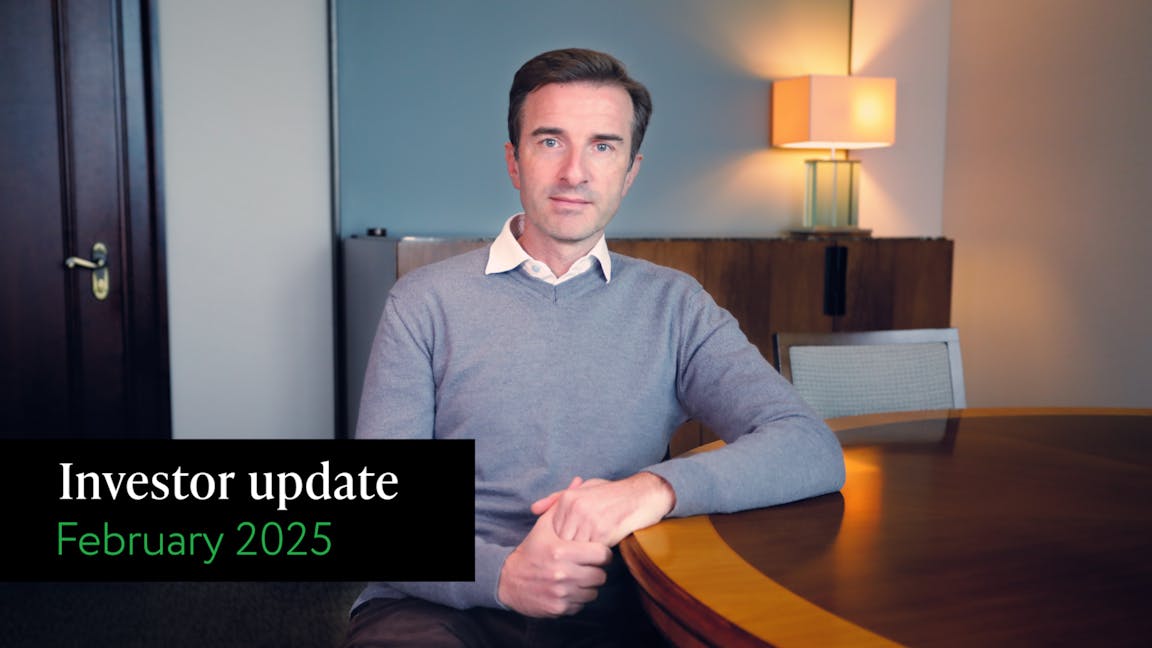
In January, all eyes were on President Trump as he returned to the White House for a second term. Equity markets gained, but there were signs of investor uncertainty.
At a glance
- Global equities gained in January, while government bonds were little changed by the end of the month. UK equities gained strongly.
- Donald Trump returned to the White House, but investors were made to wait for further detail on his tariff plans. It wasn't until early February that details started to emerge.
- A new challenger entered the artificial intelligence ring, with the release of Chinese AI 'DeepSeek' briefly ruffling feathers amongst large US tech firms.
In this latest investor update, we look back at what happened in markets in January, but at the time of publishing – 6 February – news has just broken of the Bank of England's (BoE) rate cut. Falling inflation has allowed Bank of England policymakers to cut the bank rate to its lowest level since May 2023.
The investment team's view is that – even at 4.5% – the bank rate is still well above what might be considered the neutral level. The Nutmeg team expect the policy committee at the BoE to stay on its course of gradually removing monetary policy restraint. Money markets are pricing in a further two to three rate cuts this year, but events could quickly change this.
So, what happened in financial markets in January and why?
January was largely positive for equities, despite uncertainty causing markets to falter here and there, particularly in the last week. Overall, most equity markets saw gains. Global equities rose by around 3.5%, US equity markets a little less, at closer to 3%.
The UK's FTSE 100 had a strong month, increasing by more than 6%. A notable area of interest was the performance of listed UK small and mid-cap companies. The small and mid-cap focused FTSE 250 ended the month behind the large-cap FTSE 100, although after a weaker start to the month it managed to recover during the last week. The UK faced some negative headlines over the month, primarily due to concerns about budget-related risks and low growth. This impacted the bond market and the domestically-focused British small and mid-cap stocks.
Europe, unusually, outperformed many other regions in January. Japan underperformed, moving very little over the month. Emerging markets lagged slightly, but still posted positive returns.
There was some significant volatility in UK government bonds also known as 'gilts' during the month, and to a lesser extent in US government bonds or 'Treasuries'. In the case of gilts, concerns over UK government spending spooked the market in mid-January, although ultimately they finished the month almost exactly where they started. Data released on UK inflation was more moderate than expected, renewing hopes for further rate cuts in the UK, which was positively received by bond investors.
Currencies were also volatile. The US dollar reversed most of the gains made at the start of January as new US inflation data was in line with or even slightly lower than expected. This grants the US Federal Reserve some more room to manoeuvre as needed, whereas a rise in inflation would have made life trickier for policy makers at the central bank. The strength or potential weakness of the US dollar will remain a key factor for global markets in 2025 and one to watch carefully.
Donald Trump has started his second term as president. Were there any surprises in his first days?
In January, Donald Trump returned to the Oval Office, and the future impact and actions of his administration remain a significant focus for investors. It was clearly a hot topic at the World Economic Forum in Davos, where it dominated many conversations among participants. While the initial days of Trump's presidency were generally viewed positively by the markets, two notable points emerged.
First, while the imposition of high tariffs was expected to be enacted in Trump's first days or weeks in office, investors were made to wait a little longer to find out if proposals of sweeping tariffs would become reality. This was received favourably by investors, as high tariffs are seen as a potential inflation risk and could negatively impact the global economy. However, investors are unlikely to have read too much into the delay, because of point number two; the unpredictability of the new US administration.
This unpredictability is expected to introduce a level of uncertainty, which we anticipate will create regular opportunities for engaged investors. At Nutmeg, we aim to keep a long-term perspective and look beyond short-term 'noise' generated by unpredictable comments or actions. That said, the durable impact of proposed tariffs can’t be neglected, given the potential ramifications for the US and world economies.
What is DeepSeek and does it represent a risk for US mega-cap tech stocks?
DeepSeek is a new large language model (LLM) AI by a Chinese startup, released in late January 2025. You might have heard of ChatGPT. That's a large language model – or 'LLM' based AI – as well. The release of DeepSeek caught the market off guard and led to a challenging day for US tech stocks. For instance, Nvidia experienced a 16% drop in a single day, losing more in market value than the total market value of the largest European stock. However, it's important to look beyond the headlines and focus on the mid-term outlook.
While it's undeniable that some US mega-cap tech companies (along with a few European and Asian ones) are highly valued, we believe the earnings released in January continue to demonstrate their exceptional profitability, even amid substantial investments in AI technology development. Although the threat of a Chinese startup adds a challenge to the costly process of AI development, we believe that the US's innovation capabilities remain unparalleled and can continue to support stock performance in the years ahead. There will always be winners and losers in a technological revolution, and we continue to believe that the US will be a major beneficiary. Consequently, we maintain an overweight position in US stocks within our portfolios.
About this update: This update was recorded on 5 February 2025. All figures, unless otherwise stated, relate to the month of January 2025. Source for figures: MacroBond, Nutmeg and Bloomberg.
Risk warning
As with all investing, your capital is at risk. The value of your portfolio with Nutmeg can go down as well as up and you may get back less than you invest. Past performance and forecasts are not reliable indicators of future performance. We do not provide investment advice in this article. Always do your own research.



